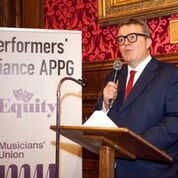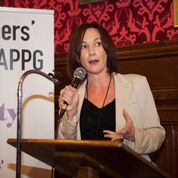Brexit was top of the agenda at the annual Performers’ Alliance All Party Parliamentary Group (APPG) reception in the House of Commons yesterday (6 December 2017).
Introducing the event – Alison McGovern MP (Chair of the Performers’ Alliance APPG, pictured above) – said that while the voice of the arts was not always represented in Parliament, with Brexit approaching the “arts must get its place on the agenda”.
She also paid tribute to the three unions that make up the Performers’ Alliance – WGGB, Equity and the Musicians’ Union – for standing up for free movement of people and their members in the face of a “pernicious and nasty, xenophobic” discourse. She added that if that fight could be won for creative workers, “we can win that fight for people in Britain”.
 Shadow Culture Secretary Tom Watson MP ((pictured left) echoed her comments, urging the three unions to “keep campaigning… we need you in Parliament telling us what we need to do more than ever.” He pledged that “we’re going to continue to press the Government on the issues raised here”, citing access to European funding after Brexit as a major concern.
Shadow Culture Secretary Tom Watson MP ((pictured left) echoed her comments, urging the three unions to “keep campaigning… we need you in Parliament telling us what we need to do more than ever.” He pledged that “we’re going to continue to press the Government on the issues raised here”, citing access to European funding after Brexit as a major concern.
Diversity was another crucial issue – and it was vital that the creative industries were not dominated by people from a narrow set of backgrounds.
Damian Collins MP, Chair of the Digital, Culture, Media and Sport Committee, agreed that everyone was concerned about the impact of Brexit on the sector, but what gave him confidence was that “we are a country full of the most brilliant, creative people” and if we have that, “we can deal with any challenge”.
 Other speakers included Horace Trubridge, General Secretary of the Musicians’ Union, and writer and actor Tanya Franks (pictured left), who outlined the worth of the creative industries to the UK – £92 billion per year and contributing more to the economy than other sectors like the automotive, life sciences or oil and gas.
Other speakers included Horace Trubridge, General Secretary of the Musicians’ Union, and writer and actor Tanya Franks (pictured left), who outlined the worth of the creative industries to the UK – £92 billion per year and contributing more to the economy than other sectors like the automotive, life sciences or oil and gas.
She spoke passionately about the impact restrictions on freedom of movement would have – and are already starting to have, in the wake of uncertainty over Brexit. The impact wasn’t just limited to Europe, she said, but also to important trade relationships with American companies, who relied on the ability of workers in the sector to move freely without visas.
Creative workers, predominantly self-employed, “held the creative sector together” she said, and if they were engaged with during the process of Brexit, they would be instrumental in helping to find the solutions.
Alongside its sister unions, WGGB is lobbying Government to protect its members during the Brexit process. Particular issues that affect writers include access to European funding, freedom of movement and intellectual property rights. WGGB has made a series of recommendations on these and other issues and will continue to fight hard for its members as the Brexit process continues.